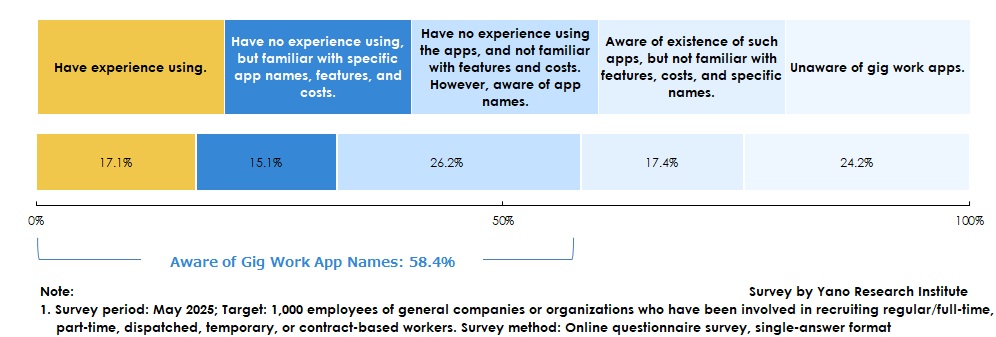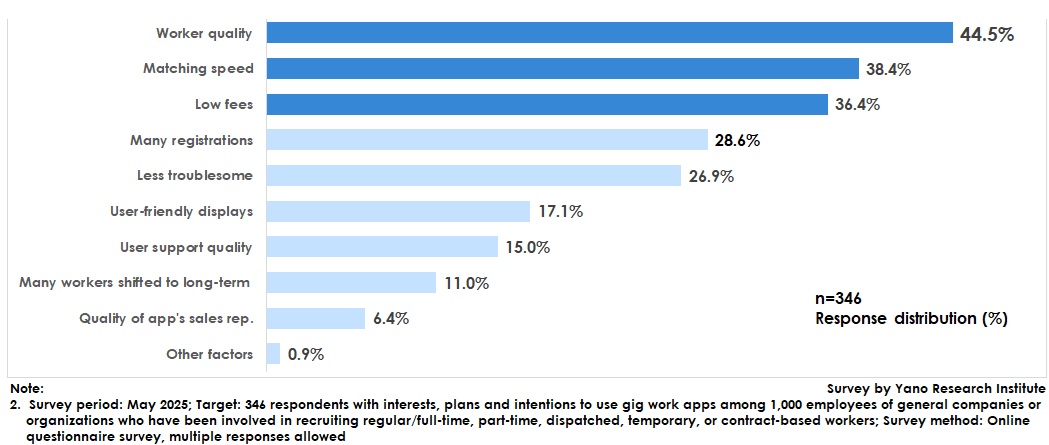No.3885
Questionnaire on Gig Work Apps in Japan: Key Research Findings 2025
17.1% of Respondents Experienced Using Gig Work Apps and 58.4% Knew the Names of the Apps
Yano Research Institute (the President, Takashi Mizukoshi) conducted an online survey on gig work apps to understand general usage by companies and organizations in general.
In here discloses the survey results regarding the utilization rates, awareness, the percentage of gig work app fees against part-time staffing costs, and the most valuable aspect when choosing these apps.


Summary of Research Findings
This online survey was conducted among 1,000 employees of general companies or organizations who have been involved in recruiting regular/full-time, part-time, dispatched, temporary, or contract-based workers.
First, the survey asked whether respondents were aware of gig work apps*, which enable companies to post one-off jobs, hire gig workers, and manage leaves and attendance. Among the respondents, 171 (17.1%) had experience using these apps; 151 (15.1%) had not used them but knew specific app names; and 262 (26.2%) knew the app names but were unfamiliar with their features or costs. In total, 584 respondents (58.4%) were aware of gig work app names.
Meanwhile, 242 respondents (24.2%) were unaware of gig work apps.
Next, the survey asked the 171 experienced users about the proportion of gig work app fees within their annual outsourcing costs per office for part-time staffing. These costs include payments to job posting websites, apps, and recruiting companies. The average percentage of gig work app fees reported was 31.4%.
*Gig work apps: platforms or smartphone applications used for posting gig work opportunities (one-off jobs lasting from a day to about a week) and hiring gig workers.
Noteworthy Topics
“Worker Quality” Was Most Important Factor to Choose Gig Work Apps for People Planning or Intending to Use or Are Interested in These Apps
The survey asked 829 respondents with no prior experience whether they had any interest, plans, or intentions to use gig work apps.
Out of these, 346 (41.7%) expressed interest, plans, or intentions, while the remaining 483 (58.3%) did not.
Next, the survey asked the 346 respondents who showed interest, plans, or intentions to use gig work apps about the most important factor when choosing one.
The most popular response was “worker quality” (44.5%), followed by “matching speed” (38.4%) and “low fees” (36.4%).
Other notable responses included “many registrations” (28.6%) and “less troublesome” (26.9%).
Research Outline
2.Research Object: 1,000 general company/organization employees who have been involved with recruiting regular/full-time, part-time, dispatched/temporary/contract-based employees
3.Research Methogology: Online questionnaire
Questionnaire on Gig Work Apps
In this research, gig work apps refer to platforms or smartphone applications used for posting gig work opportunities (one-off jobs lasting from a day to about a week) and for hiring gig workers.
This survey was conducted among 1,000 employees of general companies or organizations who have been involved in recruiting regular/full-time, part-time, dispatched, temporary, or contract-based workers. The aim was to understand the challenges in staffing, annual outsourcing costs per office for part-time staffing, the usage status of gig workers, and the awareness and adoption of gig work apps.
Among the 1,000 respondents, 171 who had experience using gig work apps were asked additional questions regarding the average time required to match gig offers with workers, their satisfaction levels, and the proportion of gig app fees within their annual outsourcing costs for part-time staffing.
The remaining 829 respondents were asked additional questions about their future intentions to use these apps, reasons for their interest (or lack thereof), and the most important factors when choosing such apps.
<Products and Services in the Market>
Challenges in staffing, usage of gig work apps
Published Report
Contact Us
The copyright and all other rights pertaining to this report belong to Yano Research Institute.
Please contact our PR team when quoting the report contents for the purpose other than media coverage.
Depending on the purpose of using our report, we may ask you to present your sentences for confirmation beforehand.